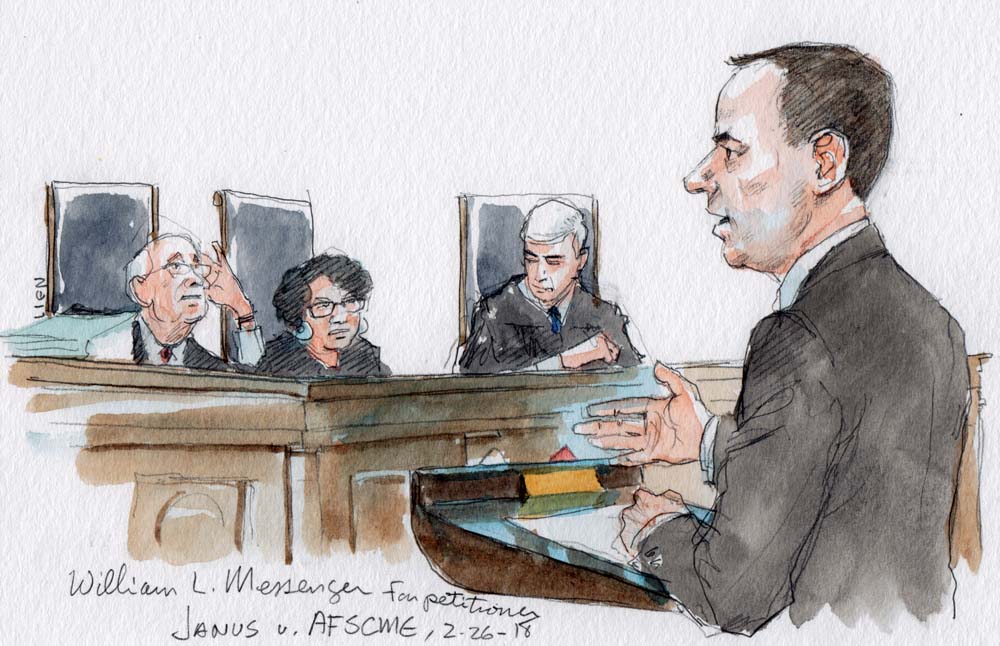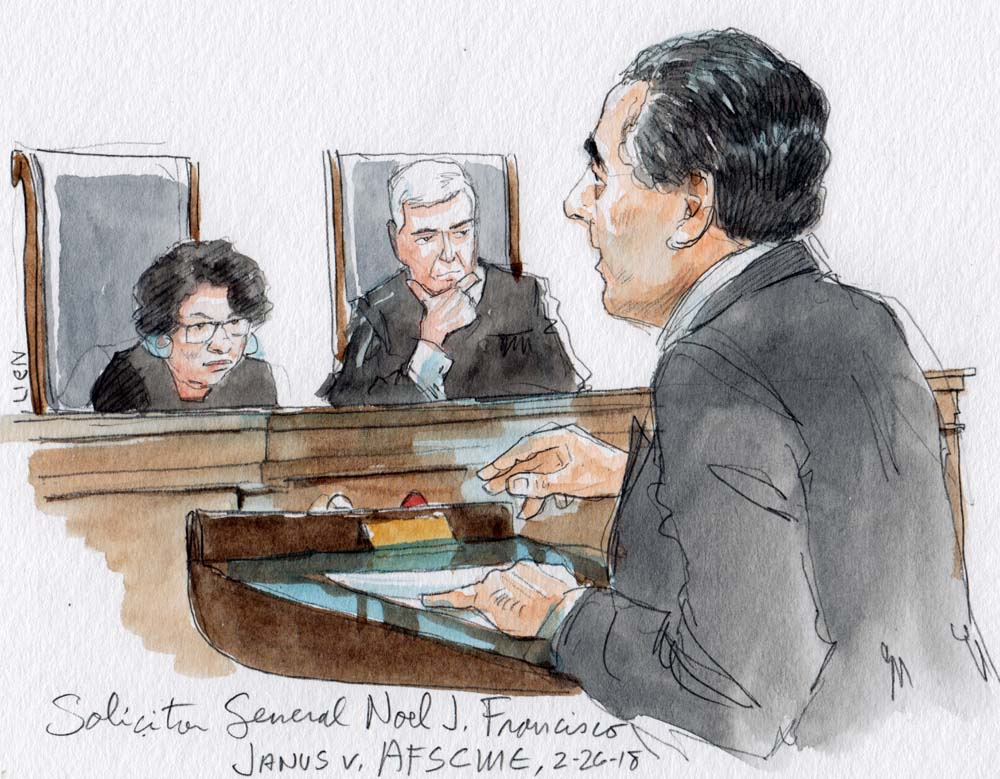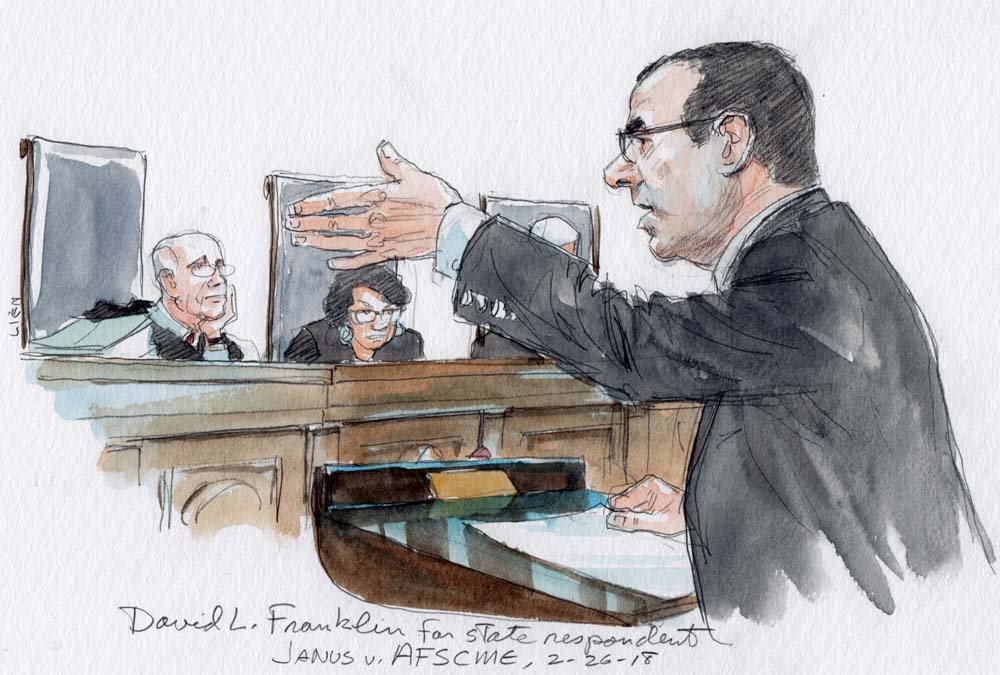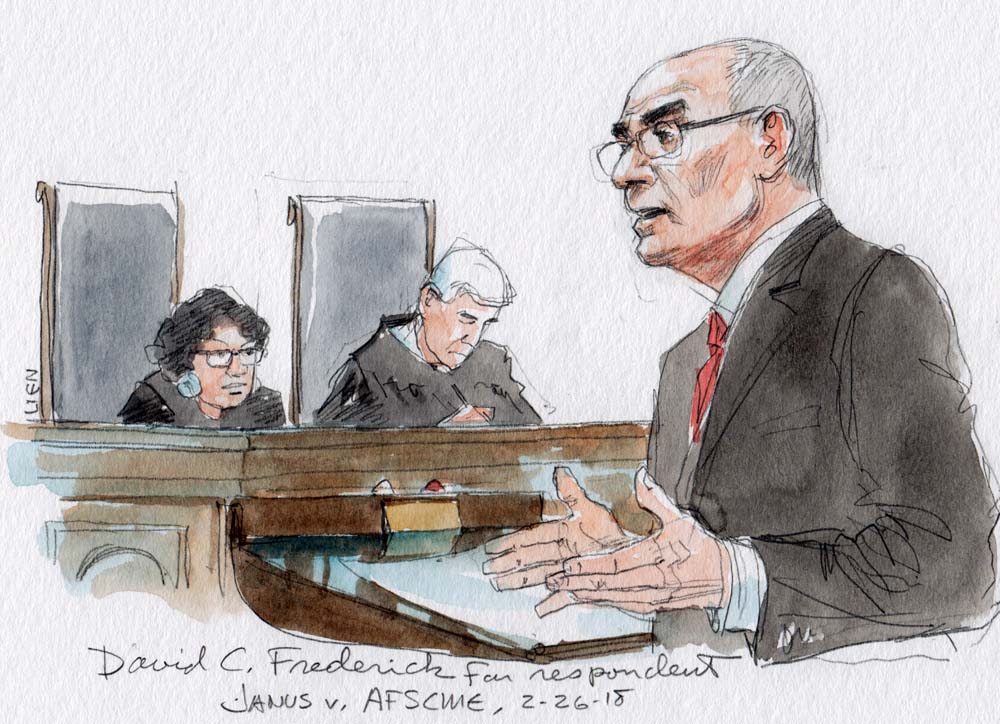Argument analysis: Gorsuch stays mum on union fees

on Feb 26, 2018 at 3:23 pm

The Supreme Court heard oral argument today in Janus v. American Federation of State, Municipal, and County Employees, a challenge by an Illinois child-support specialist to the fees that he is required to pay to the union that represents him, even though he does not belong to any union. Although this is the first trip to the Supreme Court for Mark Janus, the employee, it was the third time in four years that the justices have taken the bench to consider the issue presented by Janus’ case. After roughly an hour of sometimes testy debate in the courtroom, the outcome almost certainly hinges on the vote of the court’s newest justice, Neil Gorsuch – who did not tip his hand, opting instead to remain silent.

William L. Messenger for petitioner (Art Lien)
The dispute before the Supreme Court today stems from the $45 that is deducted from Janus’ paycheck each month to go to the local branch of the union that represents him. Over 40 years ago, in a case called Abood v. Detroit Board of Education, the Supreme Court ruled that although it would violate the First Amendment to charge nonmembers for political activity such as lobbying, nonmembers can be required to pay fees, sometimes called “fair share” or “agency” fees, that cover the union’s costs to negotiate a contract that applies to all public employees. But Janus has urged the court to overrule its decision in Abood. He contends that even these more limited fees violate the First Amendment, because the issues commonly at the heart of contract negotiations for government employees – such as salaries, pensions and benefits for government employees – are inherently political. Therefore, he says, forcing him to pay an agency fee is no different from requiring him to pay to support a group that lobbies the government.
The justices first agreed to take on the question presented by Janus’ case in 2013, in another case out of Illinois. But they declined to decide the issue then, on the ground that the plaintiffs in that case were not actually public employees. However, five justices – Justice Samuel Alito, joined by Chief Justice John Roberts and Justices Antonin Scalia, Anthony Kennedy and Clarence Thomas – suggested that they might be willing to reconsider Abood. Two years later, a group of California public-school teachers brought their challenge to agency fees to the court, but the justices had not yet ruled on their case when Scalia died in February 2016. Six weeks later, the court revealed that it was deadlocked, which once again left the lower court’s ruling in favor of the union (as well as Abood) in place.
Perhaps sensing that they could have a hard time picking up a fifth vote on the substance of the question before the court, the more liberal justices focused today on what they seemed to see as the ripple effects from a ruling for Janus. For example, Justice Ruth Bader Ginsburg told attorney William Messenger – who argued on Janus’ behalf – that a decision abolishing the agency fees would take away resources from public-sector unions, resulting in less efficient collective bargaining. The opponents of the fees wouldn’t be the only ones to stop paying them if they weren’t mandatory, she suggested; even some union supporters might stop paying them as well, simply to save money.
Justice Stephen Breyer had even bigger concerns on his mind. Messenger, he contended, was essentially asking the court to “apply a more modern framework to some older cases” like Abood. But if we overrule the court’s decision in Abood, Breyer asked, how many more old cases should the justices revisit? Should the court go all the way back to Marbury v. Madison, the landmark 1803 case that established the principle that federal courts have the power to review acts by Congress and the president?
Messenger resisted Breyer’s premise, telling him that the court’s decision in Abood was inconsistent with the cases that came both before and after it. “So this would not necessarily be solely applying a new doctrine to Abood but applying what the law was even prior to Abood,” Messenger argued.
Messenger pushed back even harder against the idea, suggested by Justice Elena Kagan, that the court should not overrule its decision in Abood because so many state and local governments, as well as unions, have relied on it for so long. If the court were to rule for Janus, she emphasized, 23 states plus Puerto Rico and the District of Columbia would all have laws overruled at once, and thousands of municipalities would have their contracts with as many as 10 million employees invalidated. When, she asked Messenger, have we ever done something like that?
Messenger tried to make lemonade out of lemons, telling Kagan that the collection of agency fees in 23 states, constituting “wide-scale First Amendment violations,” is precisely why the court should overrule Abood. Messenger also got a boost from U.S. solicitor general Noel Francisco, who appeared on behalf of the United States in support of Janus: Francisco assured Kagan that, because most of the collective bargaining agreements currently in force were negotiated “under the shadow” of the court’s earlier decisions questioning the constitutionality of agency fees, there is not “an enormous amount of reliance on the continued vitality of Abood.” And even if there were, he continued, it would be “short-lived” – lasting only until the next agreement is negotiated in a few years – so that a decision in Janus’ favor would not create much disruption.

Solicitor General Noel J. Francisco (Art Lien)
When Illinois solicitor general David Franklin took his turn at the lectern, Kennedy – who is often regarded as a key vote in high-profile cases – left little doubt about where he stood. “What we are talking about here,” Kennedy said sternly, “is compelled justification and compelled subsidization of a private party, a private party that expresses political views constantly.” Later on, Kennedy asked attorney David Frederick, who appeared on behalf of the union, whether, if the unions lose, they “will have less political influence.” When Frederick answered “yes,” Kennedy shot back, “Isn’t that the end of this case?”
Alito also seemed skeptical. “Are there any limitations,” he asked Franklin, “on the authority of the State of Illinois to compel its employees to say what the state wants them to say?”

David L. Franklin for state respondents (Art Lien)
Roberts chimed in, responding to Frederick’s suggestion that, under Janus’ theory, every employment-related issue that could come up in collective bargaining would become a constitutional issue. Roberts appeared to agree with Janus that, at a minimum, collective bargaining about wages can become a public-policy question. How, Roberts asked, does the negotiation of wages not affect the state budget? Don’t public unions engage in advocacy about the state budget, at least as far as it affects their wages?
As he often does, Breyer tried to broker a compromise, outlined in a “friend of the court” brief submitted by Charles Fried, who served as the U.S. solicitor general during the Reagan administration. Under the rule set out in a four-justice plurality in Lehnert v. Ferris Faculty Administration, Breyer suggested, nonmembers would only be required to cover the costs incurred by public-sector unions in carrying out the duties that they are obligated by state law to perform. For Breyer, this would mean costs related to wages, hours and working conditions, which “shouldn’t be hard to administer and should keep the things like lobbying and so forth out of it.” Franklin and Frederick were amenable to such a compromise, but – unfortunately for Breyer –the conservative justices did not express much interest.

David C. Frederick for AFSCME Council 31 (Art Lien)
None of the eight justices who were on the court in 2016, when it deadlocked on this same question, said anything during today’s oral argument that would indicate that they had changed their minds. If so, that would leave the decision in the hands of Gorsuch, who said nothing at all today. Before Gorsuch served on the U.S. Court of Appeals for the 10th Circuit, he was in private practice, where Frederick was one of his law partners. During his closing remarks, Frederick – who sometimes seemed to address Gorsuch directly – warned of an “untold specter of labor unrest throughout the country” if Janus prevails. We likely will have to wait until the end of June to find out whether that argument will prove effective, or whether Gorsuch will instead follow in the footsteps of Scalia, whom Gorsuch succeeded and who seemed to side with the challenger in Friedrichs, which was argued shortly before Scalia’s death.
This post was originally published at Howe on the Court.
[Disclosure: Goldstein & Russell, P.C., whose attorneys contribute to this blog in various capacities, is among the counsel on an amicus brief in support of the respondents in this case. However, the author of this post is not affiliated with the firm.]


